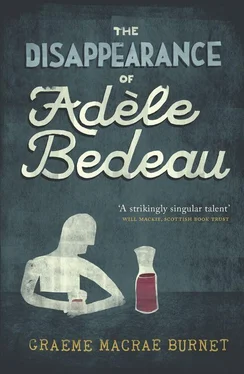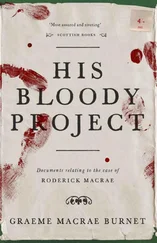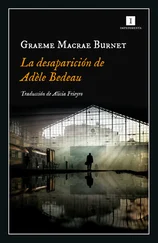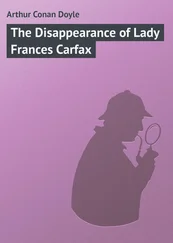The only remaining question was whether Baumann’s confession had any bearing on the case of Adèle Bedeau. The bank manager was, undeniably, a peculiar character. He had lied about his involvement in the waitress’s disappearance and, as Gorski now knew, he had committed a murder on at least one occasion. Nobody Gorski had spoken to had anything positive to say about him. On paper, Baumann was a compelling suspect. Certainly the newspapers would have little trouble persuading their readers of his guilt. Yet Gorski was unconvinced. He did not place much importance on the fact that he had lied. Gorski had learned long ago that for even the most blameless people lying to the police was a reflex. As a cop, one’s default position must be to believe nothing one was told. What mattered was not the bare fact that someone had lied, but their motivation for doing so. In the case of Manfred Baumann it was not yet clear whether he was lying because he had something sinister to hide or because he simply did not wish to become involved in a police investigation. Given what Gorski now knew of his history, the latter was possible, even understandable. On the other hand, perhaps he had been too quick to be taken in by Baumann’s story. He had, after all, had twenty years to concoct his version of events. Perhaps it had not happened the way Baumann described it at all. Perhaps he had followed Juliette Hurel into the woods and done her to death to satisfy some murderous urge. Perhaps the whole story of the days they had spent together was nothing more than the inventions of a psychotic. By Baumann’s own admission, his teenage self had displayed remarkable composure in covering his tracks and then, in the days and weeks that followed, betrayed no sign of what he done. Still, had Baumann wished to exonerate himself, he could simply have left out the unflattering details of how he had acted in the aftermath of the killing. The fact was that his story had the ring of truth to it. In any case, there was little Gorski could do to verify it one way or another.
Gorski ordered a third beer. The obese hairdresser came in. He walked to the bar, his thick legs splayed apart, and ordered a white wine. He had clearly had a couple already. He turned and surveyed the bar and spotted Gorski, who avoided his gaze.
‘Inspector, how pleasant to see you in our humble establishment.’
Gorksi looked up and acknowledged Lemerre with a curt smile. The former schoolteacher had looked up from his paper. Gorski found the hairdresser quite repellent. He waddled over to his table and spoke in a conspiratorial tone.
‘Tell me, Inspector, how’s the case coming along?’
‘I’m sorry,’ said Gorski, ‘I can’t discuss it.’
Lemerre leaned in closer. He smelled strongly of sweat.
‘Come on, Inspector, I heard you gave Baumann the third degree.’
Gorski fixed him with a steely gaze.
Lemerre gave him a theatrical wink and tapped the side of his nose.
‘So Baumann’s for the high jump, eh?’
It mattered little what Gorski did or did not say. Lemerre was no different from the majority of individuals. People loved nothing more than a murder on their doorstep, preferably a bloody and vicious murder. The idea that something dramatic had happened in their midst lent a passing thrill to their lives. It fuelled conversation in bars like this for weeks.
‘I can’t comment. If you don’t mind…’
Lemerre nodded meaningfully, as if by failing to deny his assertion, Gorski had favoured him with a choice morsel of inside information. He moved back to the bar. Gorski imagined how he would later regale anyone in the vicinity about how he had it on good authority that Manfred Baumann was soon to be done for the murder of Adèle Bedeau.
Now that Lemerre had blown his cover it would have been prudent to leave the bar at this point. He was no longer an anonymous drinker. He was a cop, around whom other drinkers must watch what they said. The conversation at the counter had become more subdued. It was not politic for Gorski to be seen getting quietly sozzled on his own. But he had no desire to go and sit around the dinner table with Céline. He should have telephoned to say he would not be home. Céline liked him to call if he was going to be late. But the beer had made him bloody-minded. He ordered another, a large one this time, like the ones the men at the bar were drinking. Did Gorski detect a change in Yves’ demeanour towards him? Did he avoid making eye contact as he placed it on the table in front of him? It was probably his imagination.
The large glass felt pleasingly weighty in Gorski’s hand. He took a healthy slug. Céline could go hang. Let her sit and seethe over her paltry, ruined dinner. They had nothing in common. They had never had anything in common. She resented him and he resented her.
Lemerre did not stay long. After he left, the conversation at the bar picked up a little. Perhaps it had been on account of the hairdresser’s presence, rather than Gorski’s, that it had subsided. Still, the men at the bar also finished their drinks and drifted away. The three youths at the corner table remained absorbed in earnest conversation. They had not paid any attention to Lemerre’s exchange with Gorski and appeared no more self-conscious than before. Clearly they were from well-off families, the sort of young men who were brought up to believe that they could achieve whatever they wanted to in life. Gathering in this least salubrious of Saint-Louis’s bars was probably an act of revolt against the fathers who expected them to follow them into the family business or profession. They had long hair and wore heavy corduroy trousers. They held their cigarettes between their thumb and index finger and narrowed their eyes as they inhaled. One of them blew smoke rings, which made a slow ascent towards the now darkened window above them. They were discussing a writer Gorski had never heard of, listening earnestly to each other’s opinions. No doubt they dreamt of defying their fathers and running off to Paris to write poetry or play jazz. Gorski empathised with them. Had he not become a cop simply to defy the expectations of his father, to assert some control over his life? Yet, he reflected, was it not the case that he would have been better suited to a life pottering around a pawnshop, in a brown store coat with a pencil behind his ear.
The youths became progressively drunker. Yves seemed unperturbed and continued to serve them round after round. What concern was it of his if they wanted to spend their fathers’ money getting smashed? Gorski too began to feel the effects of the alcohol. The beer made him bloated and he switched to wine. Later on, two men in suits, their ties loosened around their necks, came in and sat at the table next to Gorski’s. They were in town on business and clearly out for a night on the tiles. They engaged Gorski in conversation.
‘Where do you go for a bit of fun around here?’ one of them asked.
Gorski shrugged. He was having trouble focussing. Yves observed the little scene from behind the counter.
The other man asked Gorski what line of business he was in and he told them.
‘A cop?’ said the man. ‘Sorry, I…’
Gorski looked at them. They leaned back on their chairs and then returned to their own conversation. One of the youths got up and staggered towards the WC. He leant on the back of a chair, which toppled over under his weight. The boy collapsed on the floor, to the cheers of his companions. Yves came out from behind the counter and unhurriedly hauled the youth to his feet. The boy grinned stupidly at him. Yves planted him back on his chair.
‘Time to go, boys,’ he said matter-of-factly. The youths paid and piled out of the bar. They could be heard singing in the street.
Later, when Gorski returned home, he staggered upstairs without seeing the note Céline had left on the kitchen table and fell asleep without noticing that she was not in the bed.
Читать дальше












